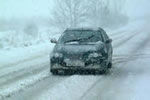by California Casualty | Safety |
 In many areas, the weather has been pretty good so far this year. But, this week started a flurry (pun intended) of winter weather, and I thought it would be a good time to recap some important safety tips for cold weather!
In many areas, the weather has been pretty good so far this year. But, this week started a flurry (pun intended) of winter weather, and I thought it would be a good time to recap some important safety tips for cold weather!
Winter Care Care Checklist – if you haven’t prepped your car for cold weather, you still have time!
What to do when your pipes freeze – It happens to the best of us (or, at least, it happened to me!). A quick guide to getting your pipes thawed without flooding your house.
Carbon monoxide safety – Firing up your heaters can lead to hidden dangers. Here are some tips for CO prevention.
Driving Safety in Snow and Ice – When the snow and ice come down, the roads get slippery. Here are some tips for making that commute safely.
by California Casualty | Safety |
 Along with hay rides, cooling temperatures, and brilliant foliage, Fall can bring some unexpected dangers to your commute. In late October and November, states across the nation see the fall mating season for white-tailed deer begin.
Along with hay rides, cooling temperatures, and brilliant foliage, Fall can bring some unexpected dangers to your commute. In late October and November, states across the nation see the fall mating season for white-tailed deer begin.
With this comes significant danger to drivers. During this time, deer become very active and unpredictable, covering large areas in search of a mate. A result of this is that drivers will often see groups of deer crossing roads.
This generates tens of thousands of deer-vehicle crashes every year, resulting in millions of dollars in damage. To help prevent this happening to you, please review the tips below:
- If you spot a deer, slow down and pay attention to possible sudden movement. If the deer doesn’t move, don’t go around it. Wait for the deer to pass and the road is clear.
- Pay attention to “Deer Crossing” signs. They are there for a reason. Slow down when traveling through areas known to have a high concentration of deer so you will have ample time to stop if necessary.
- If you are traveling after dark, use high beams when there is no oncoming traffic. High beams will be reflected by the eyes of deer on or near roads.
- If you see one deer, be on guard: others may be in the area. Deer typically move in family groups at this time of year and cross roads single-file.
- Don’t tailgate. Remember: the driver in front of you might have to stop suddenly to avoid hitting a deer.
- Always wear a seatbelt, as required by law. Drive at a safe and sensible speed, taking into account weather, available lighting, traffic, curves and other road conditions.
- If a collision appears inevitable, do not swerve to avoid impact. The deer may counter-maneuver suddenly. Brake firmly, but stay in your lane. Collisions are more likely to become fatal when a driver swerves to avoid a deer and instead collides with oncoming traffic or a fixed structure along the road.
- Report any deer-vehicle collision to a local law enforcement agency immediately.
by California Casualty | Safety |
Emergencies can strike when you least expect them, which is why we encourage all our customers to take steps to be prepared in the event an unexpected disaster strikes. That’s why we wanted to share FEMA’s efforts to help you prepare this month.
This September not only marks the 10 year anniversary of 9/11, it is also National Preparedness Month (NPM), which focuses this year on “A Time to Remember. A Time to Prepare.”
During September, we will remember those lost, honor our first responders, and renew our commitment to preparedness.
How can you participate? Go to Ready.gov to learn more. There, you can access kits, information, and guides to help you prepare your family for an emergency. There’s even a section for pet owners!
by California Casualty | Safety |
 Did you know, every year there are around 10,000 fireworks related injuries in the US? On top of that, they can put you at risk for damaging your home or starting brush or forest fires.
Did you know, every year there are around 10,000 fireworks related injuries in the US? On top of that, they can put you at risk for damaging your home or starting brush or forest fires.
We want you to have a good time this holiday weekend, but we also want you to be safe! That’s why we looked to the National Council on Fireworks Safety to provide some good tips to stay safe this 4th of July!
1) Use fireworks outdoors only
2) Obey local laws – many communities down allow you to shoot fireworks!
3) Watch for burn/fire bans in your area!
4) Only use fireworks as intended
5) Alcohol and Fireworks DO NOT MIX.
6) Use common sense – stay a safe distance away from lit fireworks
Happy 4th of July from California Casualty!
by California Casualty | Safety |
Hurricane season is upon us, after a violent spring storm season. Hopefully, we’ve seen the worst of the severe weather for the year, but it pays to be prepared.
The NWS National Hurricane Center has some great resources for learning more about hurricanes, their dangers, and safety precautions you should take.
It will help you identify the main questions you need to be able to answer if you are in a hurricane prone area:
- What are the Hurricane Hazards?
- What does it mean to you?
- What actions should you take to be prepared?
You should also consider calling your insurance agent or customer service department to make sure you have the appropriate coverage in case disaster strikes!
by California Casualty | Safety |
Memorial Day, for many people, means the start of the summer boating season. It also means a lot of people will be out on the water…many of them novices who may not have a good grounding in boating safety.
Here are some good tips from Treadlightly.org to help keep you safe on the water:
* Travel only in areas open to your type of boat.
* Carry a Coast Guard approved life vest (PFD) for each person on board.
* Always operate your boat at a safe speed.
* Always have a designated lookout to keep an eye out for other boaters, objects and swimmers.
*Never jump a wake. If crossing a wake, cross at low speeds and keep a close lookout for skiers and towables.
*Comply with all signs and respect barriers. This includes speed limits, no-wake zones and underwater obstructions, etc.
* Make every effort to always go boating with a partner.
* Make certain your trailer is in proper working order and that your lights work and your boat is secure on the trailer before you travel to your destination.
* When trailering your boat, balance your load including items stowed inside your boat.
*Don’t mix boating with alcohol or drugs.
 In many areas, the weather has been pretty good so far this year. But, this week started a flurry (pun intended) of winter weather, and I thought it would be a good time to recap some important safety tips for cold weather!
In many areas, the weather has been pretty good so far this year. But, this week started a flurry (pun intended) of winter weather, and I thought it would be a good time to recap some important safety tips for cold weather!
 Along with hay rides, cooling temperatures, and brilliant foliage, Fall can bring some unexpected dangers to your commute. In late October and November, states across the nation see the fall mating season for white-tailed deer begin.
Along with hay rides, cooling temperatures, and brilliant foliage, Fall can bring some unexpected dangers to your commute. In late October and November, states across the nation see the fall mating season for white-tailed deer begin. Did you know, every year there are around 10,000 fireworks related injuries in the US? On top of that, they can put you at risk for damaging your home or starting brush or forest fires.
Did you know, every year there are around 10,000 fireworks related injuries in the US? On top of that, they can put you at risk for damaging your home or starting brush or forest fires.